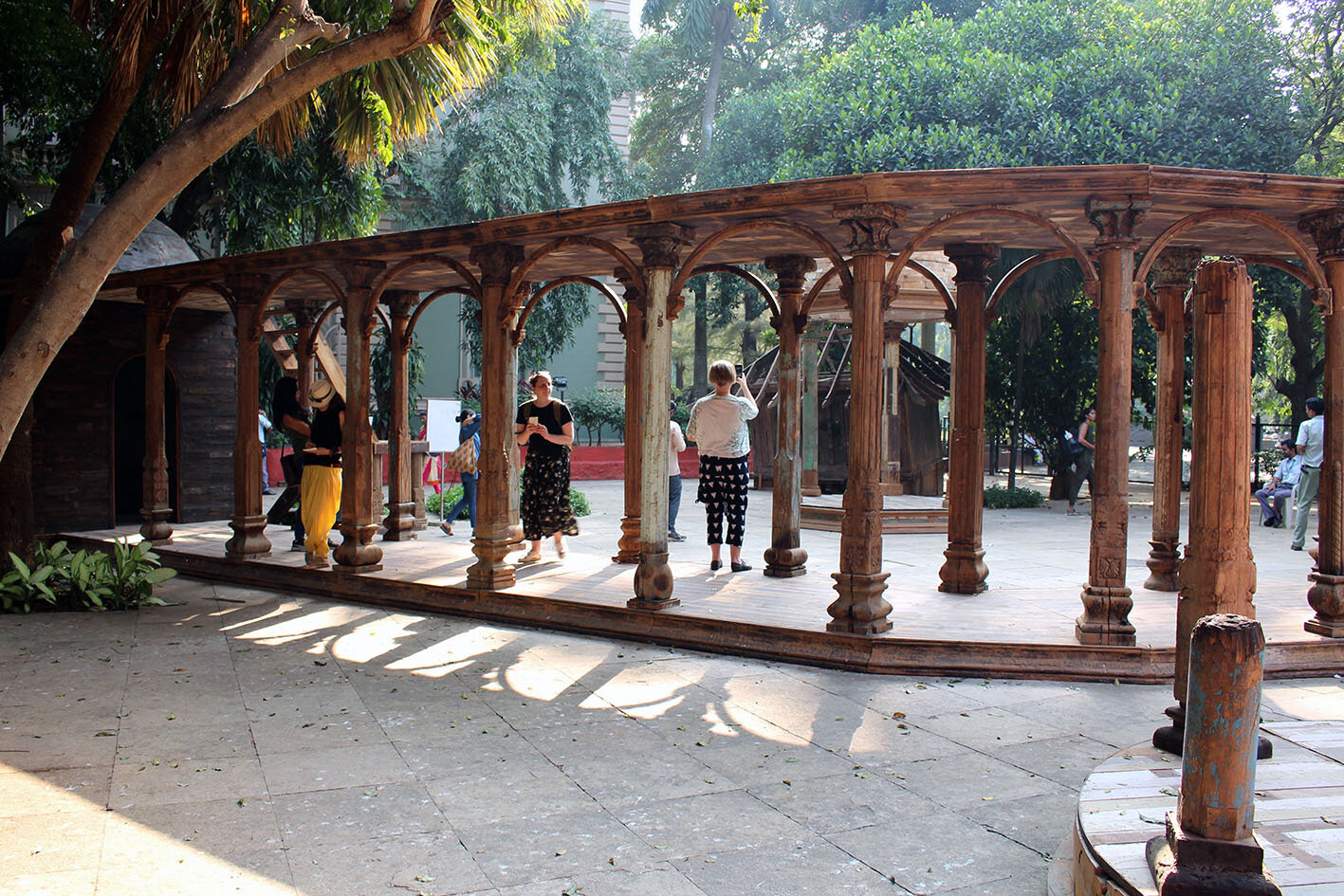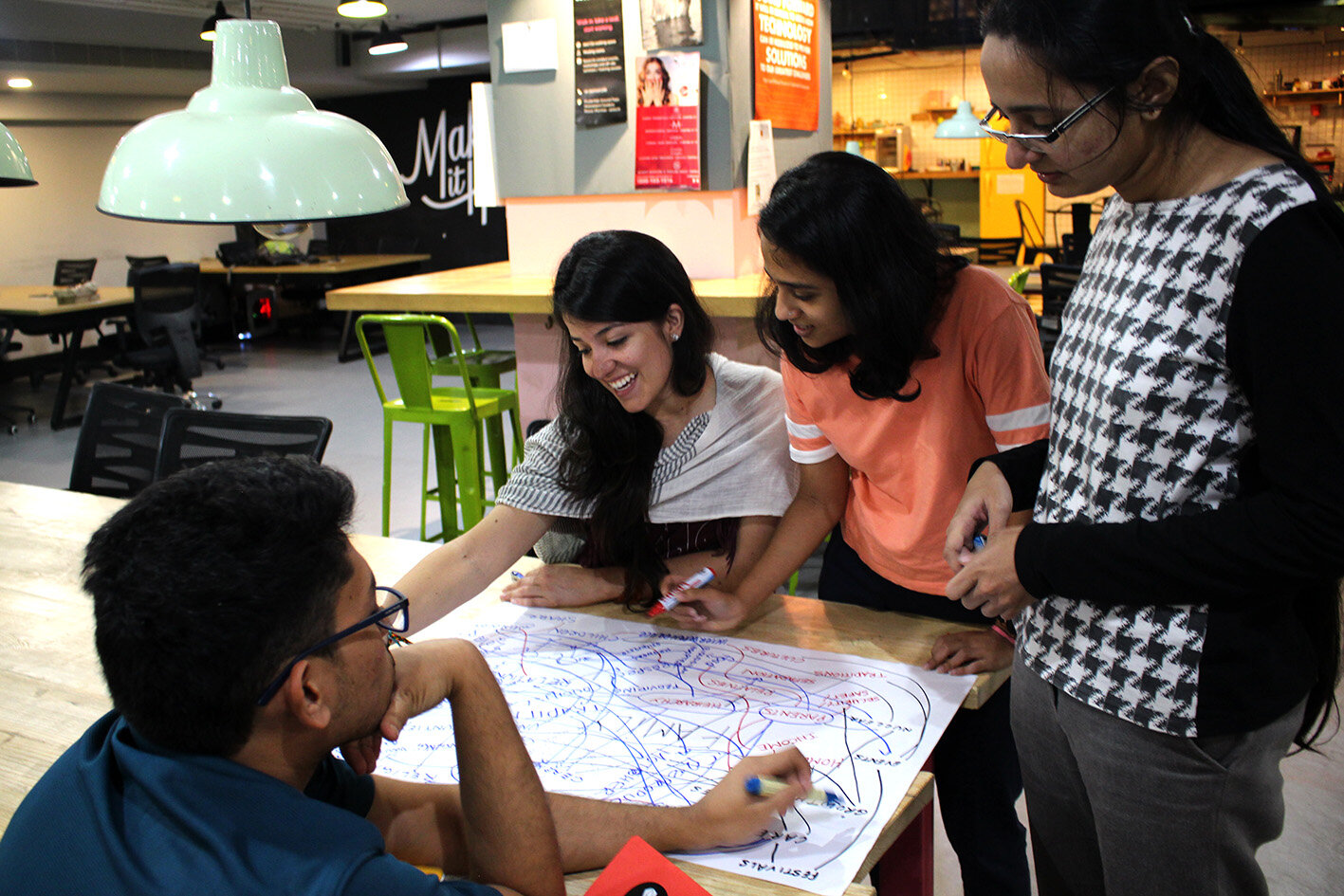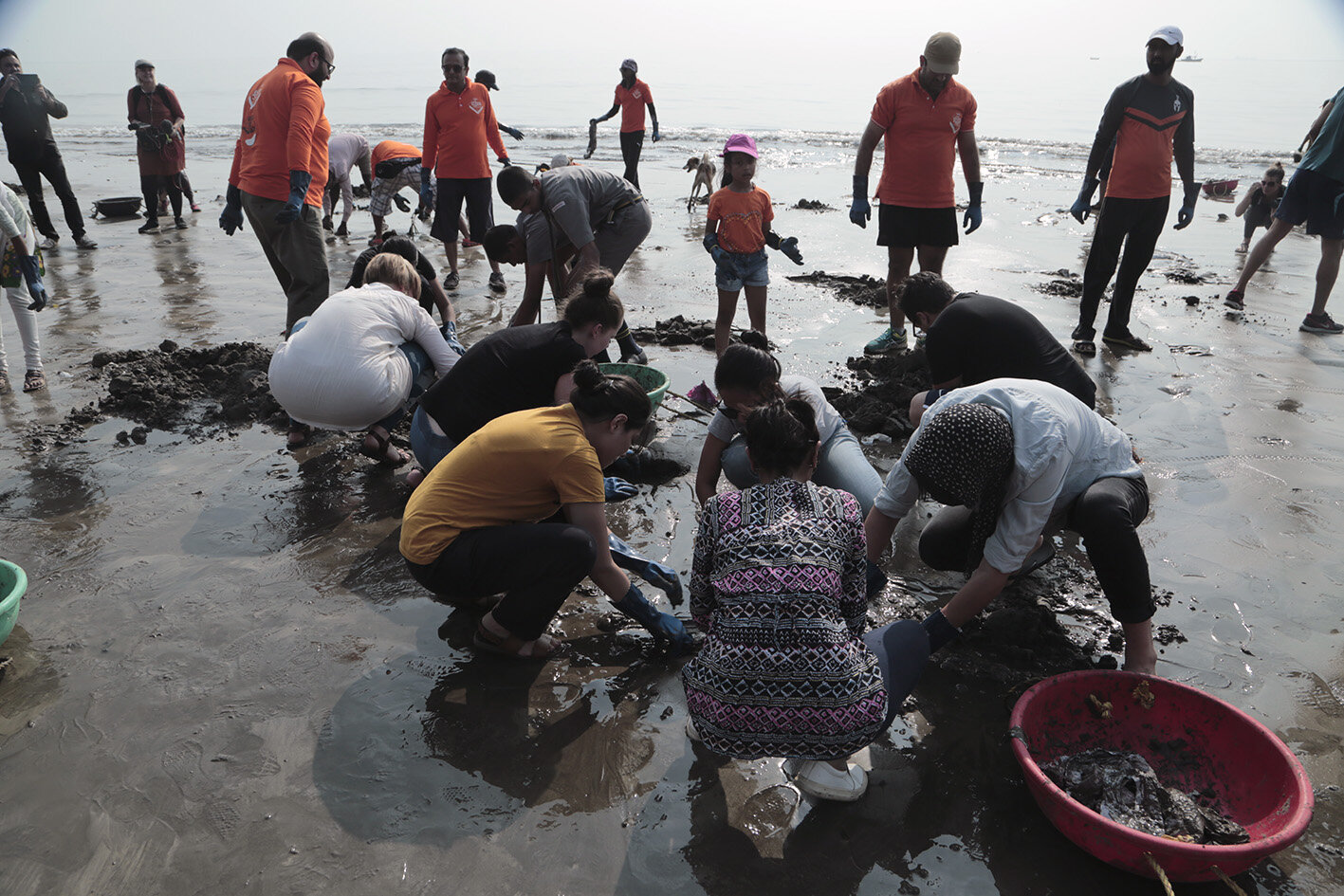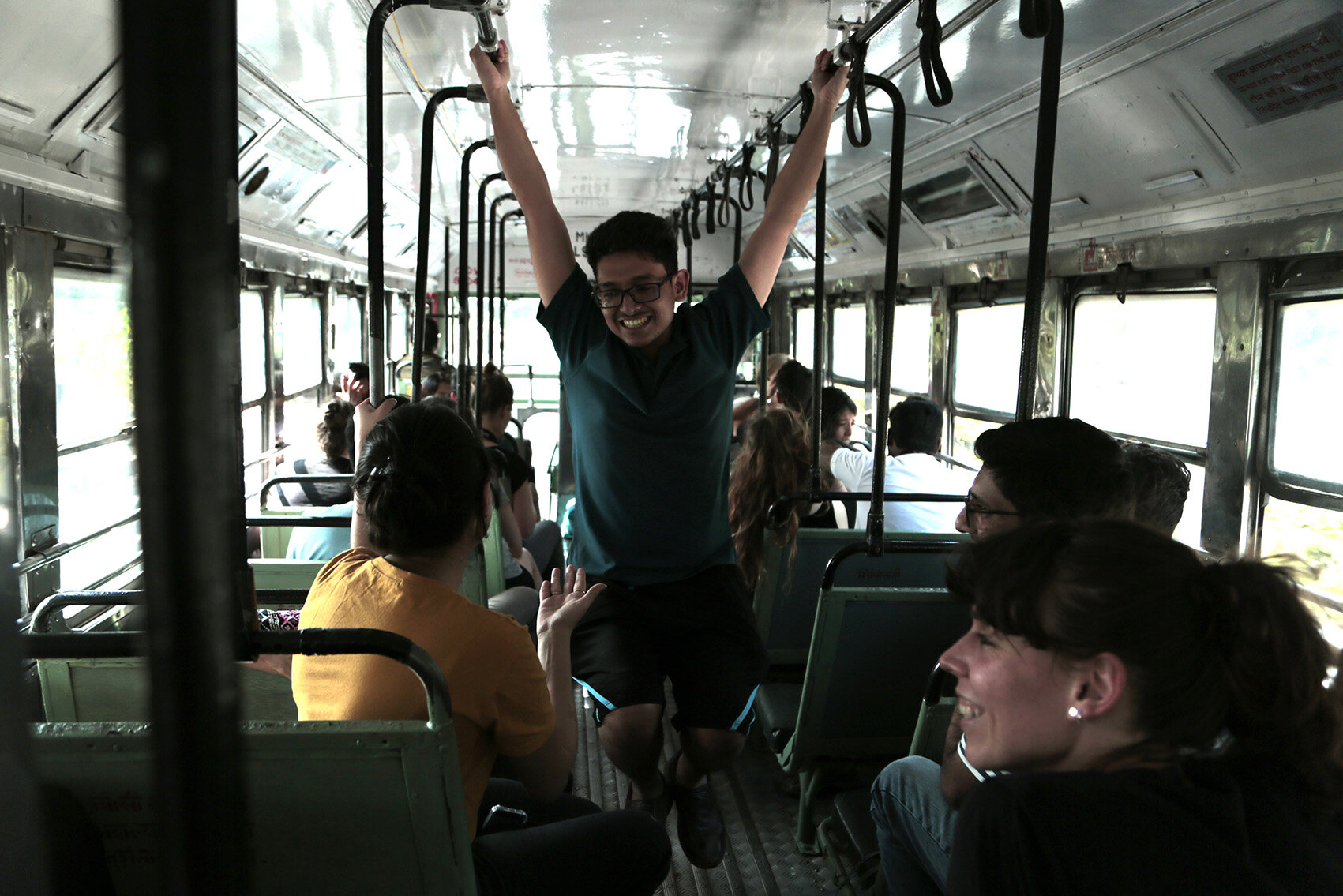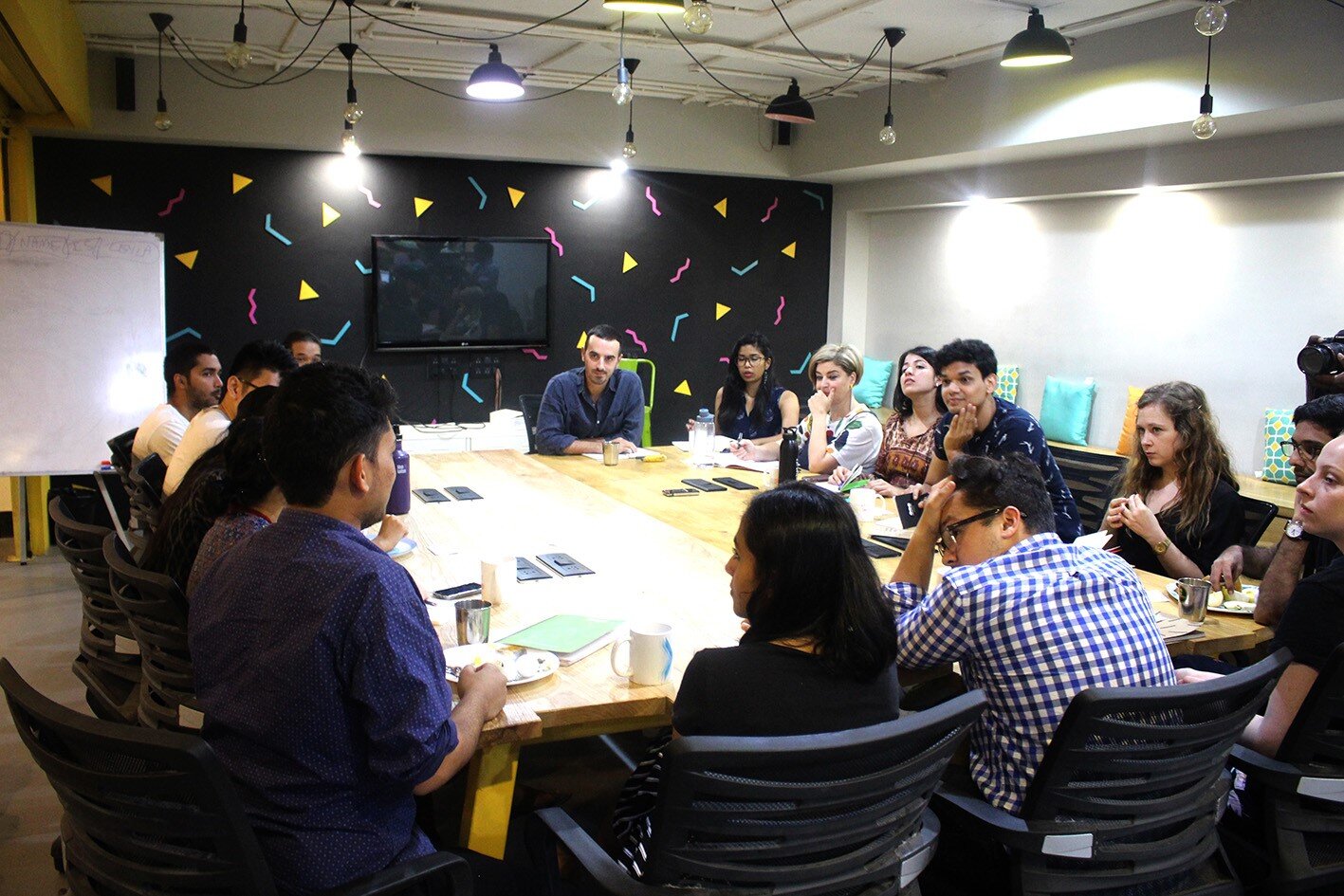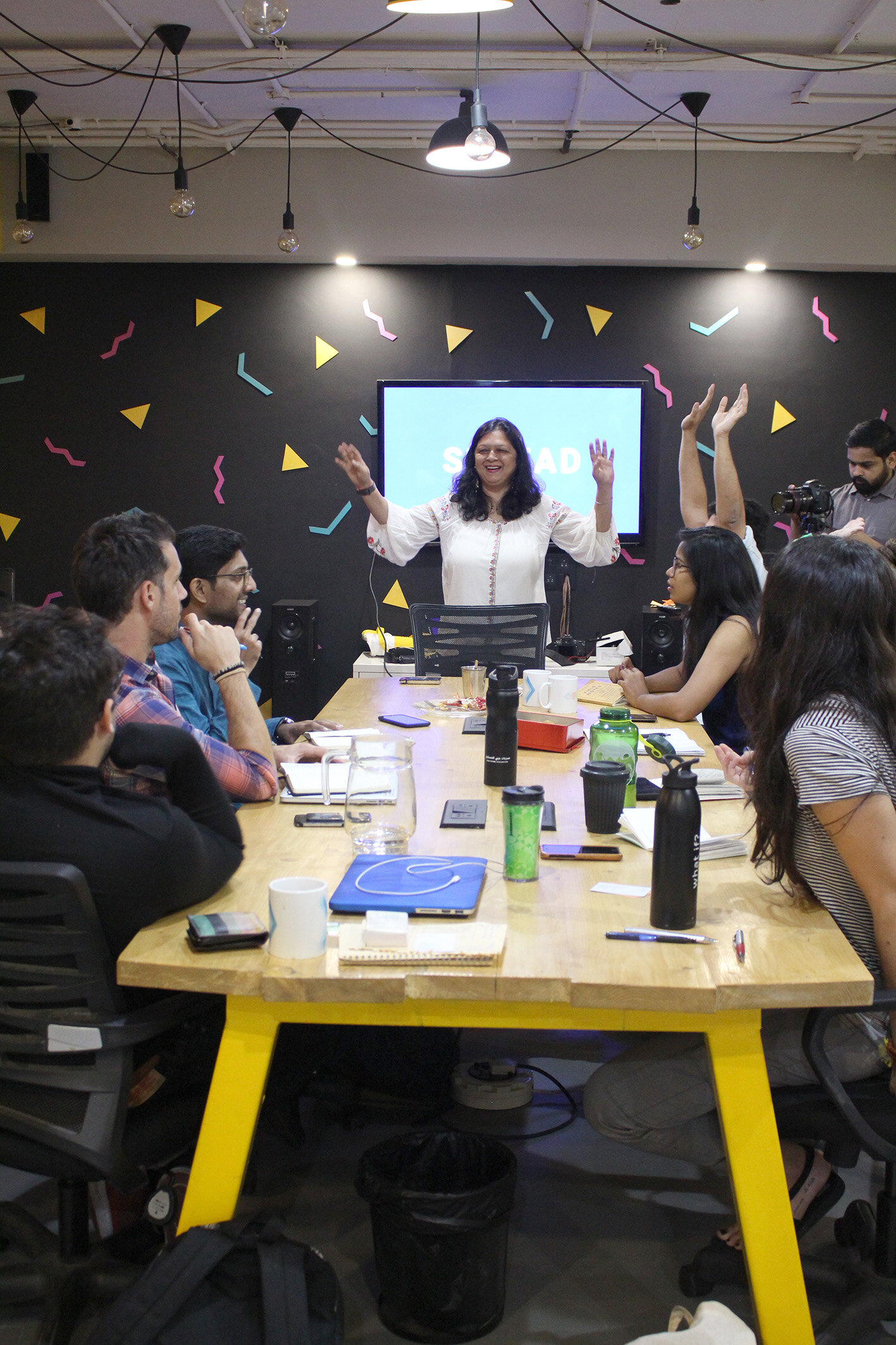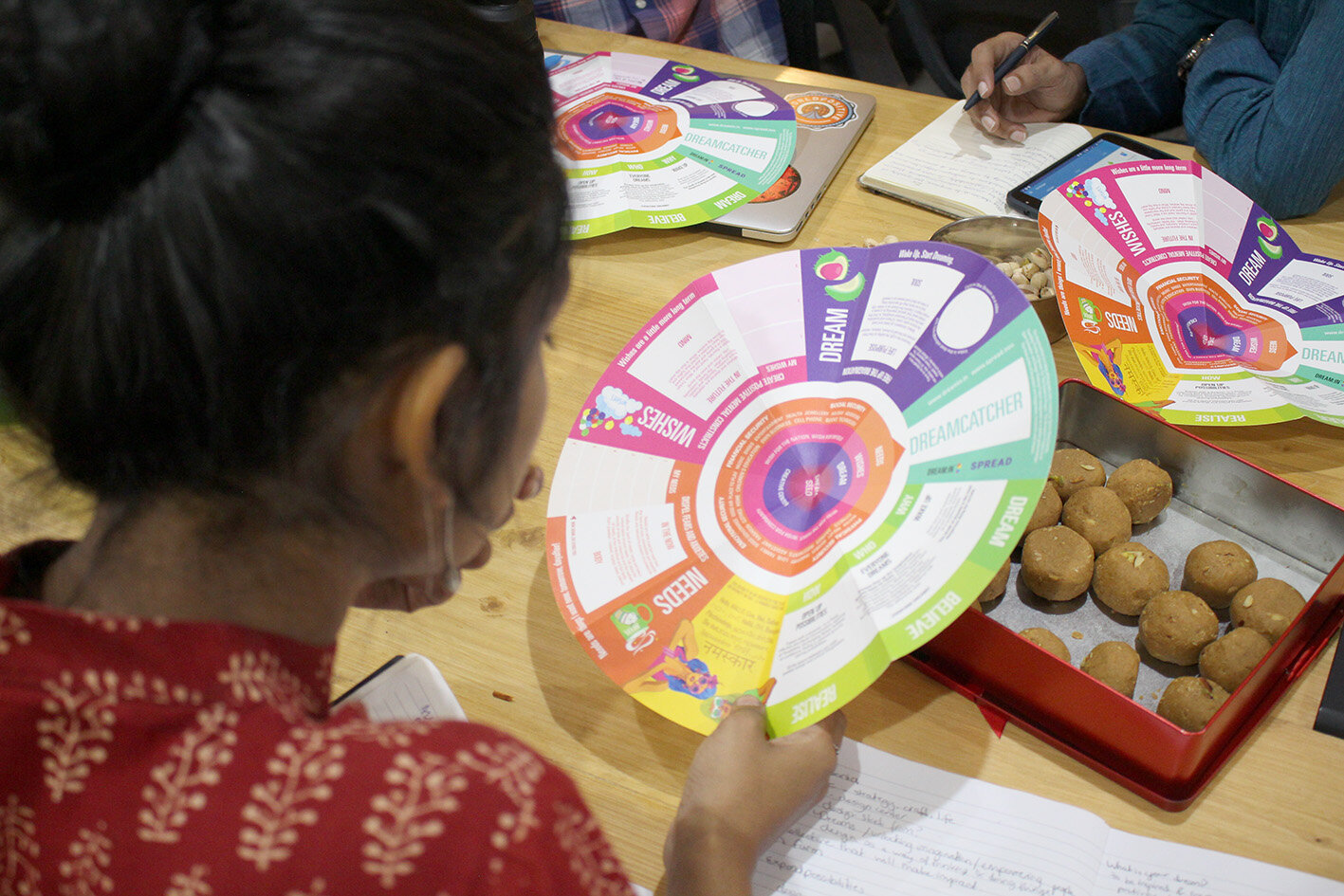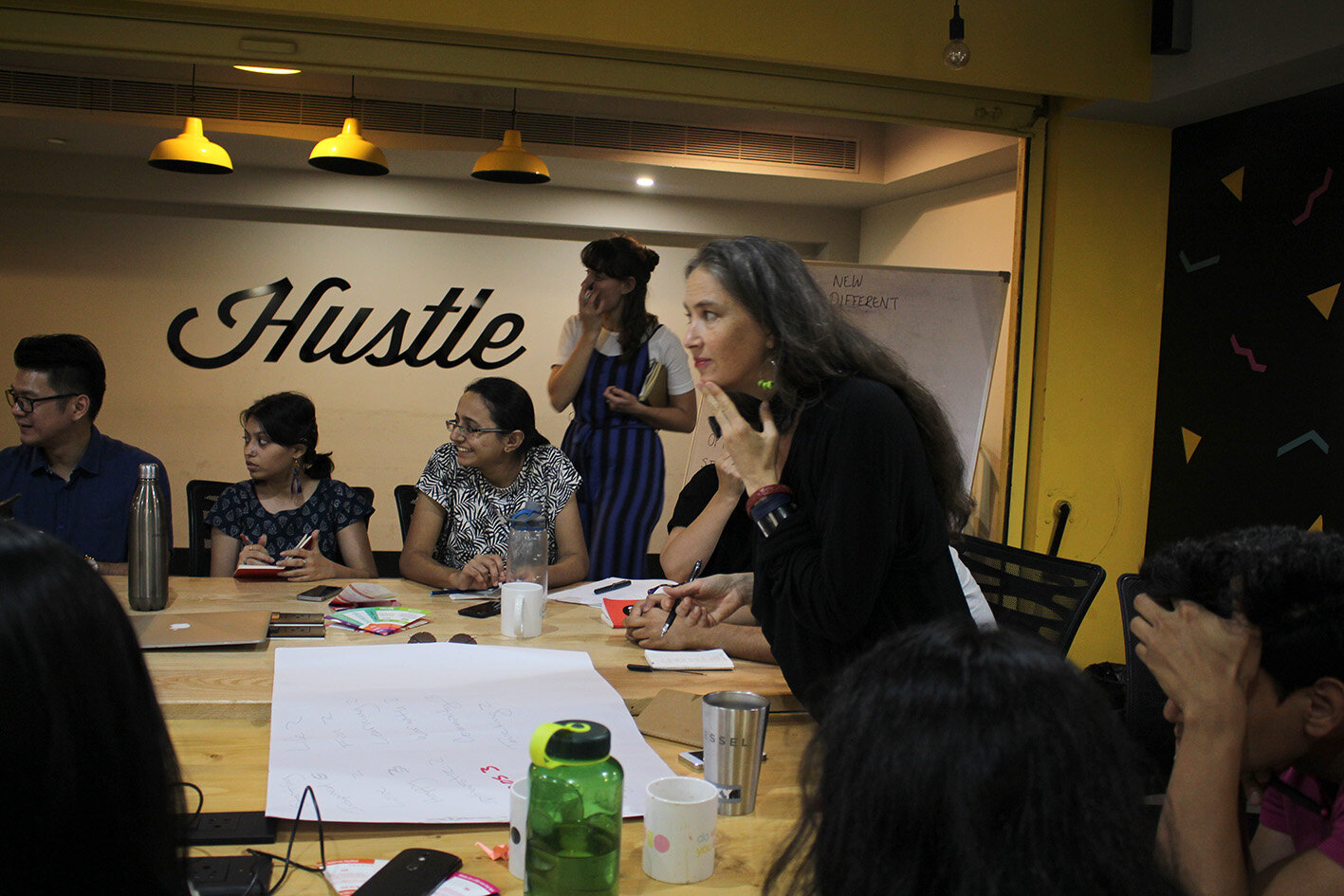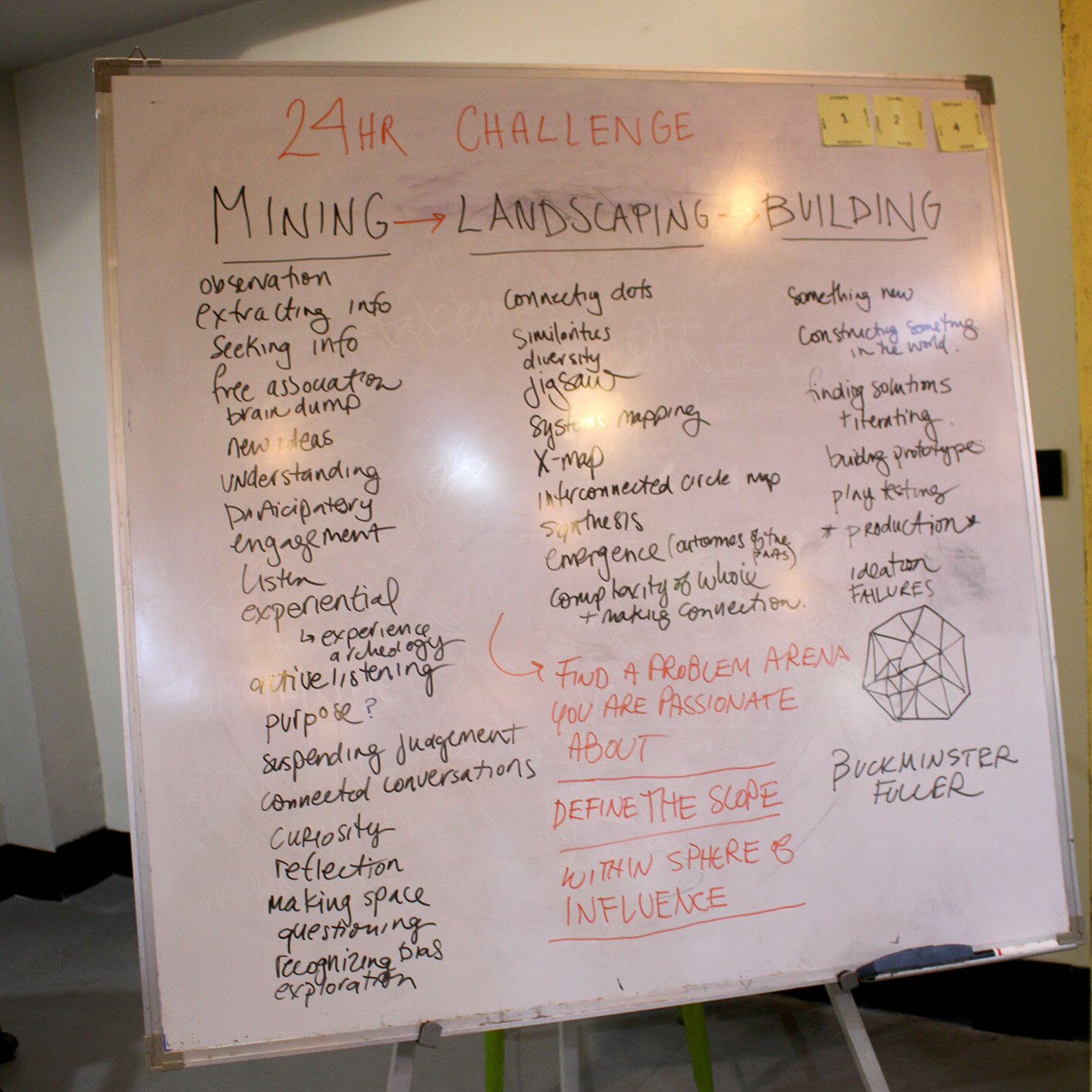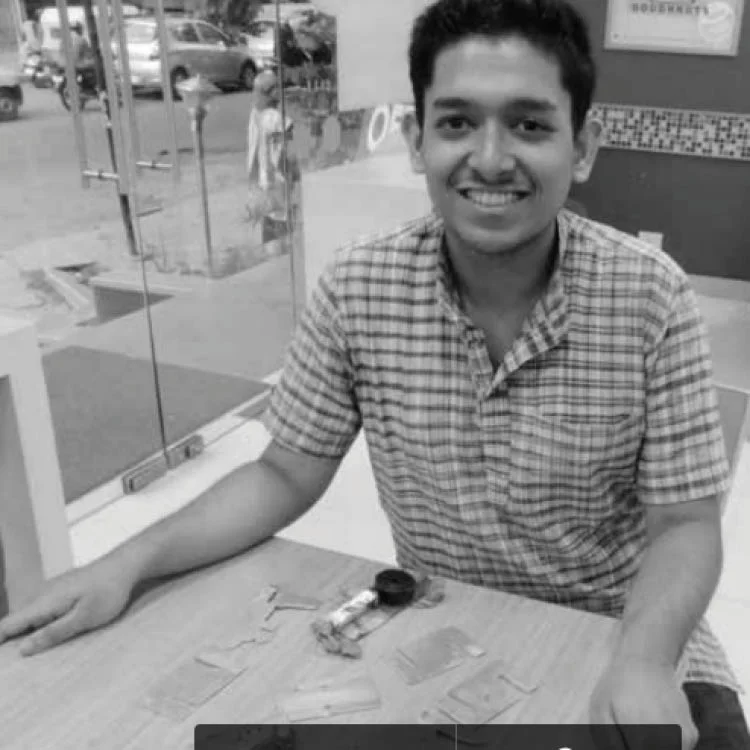The UnSchool’s 8th emerging leaders fellowship program happened in November 2017 in Mumbai, India. Check out everything that we got up to in this incredible week-long adventure.
DAY 1 | November 11th, 2017
The 8th UnSchool Emerging Leader Fellowship launched in southern Mumbai on November 11th at the majestic gates of the Mumbai Rani Baug. Nearly everyone was on time despite the quintessential Mumbai traffic. Amongst the beautiful greenery and the symphony of car honking, we started off in true UnSchool fashion with a one-legged stand that allowed us to quickly learn each other's names by colluding memory with physical effort.
Walking a short distance to our first adventure, we were delighted by a visit to the magnificent Dr. Bhau Daji Lad Mumbai City Museum (originally named the Victoria & Albert Museum, pre-independence after Prince Albert who co-founded the museum with Dr. Bhau Daji Lad). We were guided by wonder woman Anita, an incredible volunteer educator who shared her extensive knowledge on the influence of history on arts, crafts and design. The cohort was exposed to the contrasts between function and form, conceptual art and symbolic art. With Anita’s wonderful narrative of the museum’s authentic artifacts, we gained a historic context that fired up our neurons and began the UnSchool-esque unravelling of what we think we know! Did you know that Mumbai was originally a cluster of 7 islands!? Well, we didn’t! There is more to Mumbai than meets the eye!
From the museum we walked through Shoonya Ghar, a wooden installation by contemporary artist Sudarshan Shetty, symbolic of the poetic contrasts within the artist.
At the museum’s Educational Center we shared our 3 minute 9 slide life stories, Pecha Kucha style. And Pecha Kuchas never disappoint! We learned about the group’s compelling projects, diverse domains, unique qualities, and brilliant brains. After agreeing on the consequences when the don’t-be-late rule is broken (oh, what it is? Hmmm, it’s a fellowship secret!), we settled into an always eye-opening core knowledge session on Sustainability with Leyla, and of course, good brain-building snacks.
As evening fell over Byculla, we piled into cabs and started a mini challenge. Through a game of 20 questions, each group had to discover a secret word which served as the lens with which to complete the observational challenge. Through the windows of the cabs and with the prescribed perspectives - such as happiness, creativity, contrast, community - fellows went through a rapid fire observation session while traversing the streets of Mumbai. In sharing observations and insights many rich discussions were had about the power of seeing the world through different lenses.
Next stop was the Flora Fountain (disappointingly covered in scaffolding as it is being restored), our starting point for a short walking tour of some of the incredible architecture and monuments of Mumbai. We compressed into a tight group to cross the road in a pack of humans (thanks to fellow Umang for suggesting this nice little life hack) and meandered through the sensory overload of sounds, sights, smells and excitement of bustling south Mumbai. Through the side streets of Mumbai's burgeoning and eclectic local design scene, we saw many creative sights and soaked in the beautiful chaos of Mumbai while building up a healthy appetite.
Finally we reached our final destination: the creative vegetarian restaurant, Chetana, where we sat down UnSchool-family-style to enjoy a colorful Indian Thali feast, a variety of dishes curated on a delightfully diverse platter, just like the UnSchool fellowship.
Everyone savored the perfectly combined flavors of the deliciously colorful dishes. Toasts were made. Trivia challenged. Stories shared. With new connections and full bellies, Leyla reminded us of the early start for day number 2 (and to not be late, or…).
DAY 2 | November 12th, 2017
Beach clean up with Afroz Shah
Day 2 of UnSchool Mumbai started off with the fellows sharing their ‘thing’ they brought from home with the group. There were pandan cakes, handmade brass objects, Malaysian wood print blocks, handwoven saris. The varied backgrounds of the group made for such a fascinating culinary and visual show and tell of diversity and culture.
Afterwards, we went straight into a deep-dive workshop into systems thinking with Leyla. She walked through the main concepts of systems explorations, systems dynamics and how they can be applied to complex problem solving and day-to-day life. The group collectively mapped the 3 interconnected systems at play in the world, then Myrthe facilitated the systems mapping session where small groups explored a critical social system.
Once we had pushed our brains into the realm of systems thinking, we filled our bellies with platefuls of delicious veggies cooked up by the team to charge-up for what was to become an incredibly adventurous afternoon.
We gathered outside Of10 eagerly waiting for what would come next. Priyam, our local producer (UnSchool Alumni from Berlin Fellowship) had managed to make some transport logistics magic happen. Now quickly becoming a new UnSchool tradition of frizzle-esque transportation, we got onto an old BEST bus, which would otherwise be functioning as a Mumbai public transportation bus.
This was a crazy surprise to some of our local fellows, who experienced a bus ride in an entirely new light. There were gasps of shock that it was even possible to hire a BEST bus, and shared stories of extremely packed buses and the gender segregation norms they were breaking by sitting on the ‘other side’.
The bus rattled along many Mumbai streets to our final destination of Versova beach, where we met Afroz Shah - fellow UNEP Champion of the Earth - who for 108 weeks has been running the world’s biggest beach clean up. Afroz has cleaned an impressive 5 million kilos of waste together with an incredible collection of locals, school kids and Bollywood stars (amongst others).
Our group of 22 added to over 200 people from all walks of life cleaning the beach. We joined school children, the local mayor and international guests and people from the UN environment program who were shooting a video as part of the global #beatpollution campaign.
We all eagerly donned the recently donated reusable gloves and got right to work, digging deep into the sand to find layers of plastic waste. Everyone was instantly shocked by the incredible amount of plastic bags, sauce packets, tiny lids and other unidentifiable bits of plastic impregnated into the beach. There were even old backpacks, shirts and shoes pulled from the sand. The clean up can only be performed during the low tide, but once you start it's hard to stop. Even as the water started to creep back in around our ankles, we were all busy working together to free the plastic debris from the grips of the packed sand. We talked about the lack of anything else we could find, such as shells or other beach life you are used to seeing. We looked along the the shoreline into the uncleaned part of the beach and saw mounds of trash, much of it being brought down to the ocean from the seven local rivers that connect to it.
After all the cleaning, we were invited to join Afroz and his many volunteers at his house for chai and dinner. As we sat around his home, we heard the inspiring story of Afroz’s passion for clean oceans, stories of the local volunteers who have helped him create a global movement, and the many people who have learned to love nature as a result of doing the simple act of cleaning.
There was magic in the air as we shared our own experience and discussed how such a massive problem can be addressed by taking small actions, and by how using your own two hands you can literally change the world. To add to the magic, we then sat down to the most incredible south Indian feast served on banana leaves cooked by Afroz and his neighbour Mona (with the very effective help from some of our fellows). The community of incredible volunteers fed us till we were beyond full of delicious food. This glorious day and evening ended with a bang --- Just as we were saying our farewells, our hosts popped on a song called Leila Leila (yes because of Leyla) and Mona insisted on a bollywood dance fest with her and Leyla leading everyone into a mini mosh pit of dancing, clapping and hugging. And just like that, we hugged our new friends and jumped back on our awaiting BEST bus for the long Mumbai night ride home.
On the bus ride back, it was time to reflect and process this crazy and activating day. Humbling, satisfying, inspiring, full, grateful, light were some of the words that fellows used to describe their experience of the day. Myrthe then asked everyone to pair up and spend the ride home sharing our stories of why we had felt that way as the bustle of this beautiful chaotic city whizzed past our windows and reminded us of just how amazing this world is.
DAY 3 | November 13th, 2017
Day 3 kicked off with a question-filled breakfast where fellows found a small card on their plates and were asked to chat with others around the key question. Zubin Sharma, our mentor for the morning, had planted these prompts as food for thought and a great introduction to his morning session.
Zubin started off by sharing his personal journey from growing up in upstate New York to living and running Project Potential in Bihar (in eastern India). His personal story of discovering his purpose and passion provided the foundation for his session on exploring and understanding our own individual purpose on why we do what we do. He asked the group to pair off and ask each other 5 key questions: Who am I? What do I do? Who do I do it for/with? What do they need? How do they change as a result?
Then the fellows quickly developed a purpose statement in 10 words or less, and shared them back further distilling their vision for their personal change-making career. Zubin shared some magic tips to power them up:
Use the silence
Speak every word
Make sure everyone is with you
Kindness, passion, transition, action and sustainability were all recurring themes in the purpose statements shared by the fellows. Constructive feedback loops within the group increased the strength and conviction behind these statements, making them extremely powerful and convincing.
We then continued to bring our personal stories into a public narrative, to find new ways of framing the stories that engage and activate others. Zubin’s session ended with a reflection on how to tell human stories with dignity and respect, and how personal experiences form the base of powerful stories.
The conversations continued through lunch, a tasty and colourful spread of vegan Indian food made locally by a magician of a chef (she uses no oil, and we could not figure out how she added so much flavour!). Fully charged, we ran through a spontaneous mini workshop with Leyla, who built on the morning session and provided tools to create our own theories of change.
The afternoon sessions kicked off with a visit from Madhuvanti, Design Director of Taxi Fabric, who shared her story as a textile and product designer creating collaboration opportunities for artists. Her organization matches taxi drivers and local artists together to design the interior of taxis with fabrics that tell stories about the city. We learned about their business model, methods, and had thoughtful conversations about culturally influenced branding.
Then it was time for afternoon chai and a ridiculously funny game of biscuit toss that filled the space with laughter and energy as we tried to toss cookie pieces into each other’s mouths. The afternoon progressed into a deep-dive workshop with mentor Dagny Tucker, CEO and founder of Vessel, where we dissected cultural norms, structural violence, the impacts of industrialization, and were given tools to identify leverage points for intervention.
Dagny led the group into the root cause of un-sustainability, connecting it to the industrial revolution and the deep-seated need for conspicuous consumption. We discussed opportunities through social life cycle assessment, and she offered thought-provoking examples of the social and environmental impacts of everyday things like shoes and hand sanitizer.
The next session, led by co-host Sri, started off with the fellows asking uncomfortable questions to other. This was an experience designed to demonstrate the sensitivities of social research, and to ponder how as researchers we can be less intrusive, more empathic and ethical in how we get to the needed insights. Human beings don’t always do what they say they do, and researchers need to find ways of identifying the actual rather than conceived data. Sri shared some interesting case studies from her work as a Behavior Architect and then introduced the topic of gamification in anticipation for a fun challenge that would be offered later in the evening.
At this point, the group was extremely cognitively stimulated (and maybe a little overloaded!), so we stepped outside where our other co-host, Myrthe, facilitated a reflection session. She focused on constructing the various components discussed during the day and the emotion felt around it. The nature of the session, augmented with the outside space, brought back all the warmth, energy and joy - just enough for Leyla to challenge them to a challenge! ;) Yes! The day was not over yet as the fellows accepted Leyla’s challenge to create a gamified experience in an allocated local neighborhood, in two hours.
The group was split up into smaller groups and each provided with a specific area on the map, a few fun limitations (like only one person in the group can talk, no transport can be used, etc), and various budgets. This was to enable the fellows to apply their learnings on research, systems thinking and gamification to design an experience.
The two hours flew by and each group eagerly shared the bones of their ‘game plan’, to be discussed in more detail on... Day 4 of #UnSchoolMB.
DAY 4 | November 14th, 2017
An action-packed day in the field meant an early 7am start for #UnSchoolMB. As the last fellow sneaked in the back of our awesome BEST bus in an attempt to avoid the (often rather embarrassing) consequences of breaking the don’t-be-late-rule, we headed out for a series of experiences.
En route, Leyla and co-host, Sri, led a feedback session reflecting on the mini-gamification challenge from the night before. We were entertained as we talked through all the motivations and game mechanics that were drawn upon to create the gamified experiences, while balancing ourselves on the moving bus. Designing games that make change is not as easy as you think it might be, and the fellows helped to dissect the ways in which games can have a positive learning experience.
At the peak of the morning city bustle, we arrived at Mumbai Dhobi Ghat: The World’s Largest Open-Air Washerman Colony and were met by our insightful guides, Suraj, Hitesh and Jatin from Reality Tours & Travels. Before leaving the bus, Leyla took the fellows through ways of respectfully engaging with people in their own community, while seeking to gain insights and understanding. With open minds, we followed the local experts from Reality Tours (an ethical tour company that hires local guides and donates 80% of their profits to educational initiatives in Mumbai's slums) into the Dhobi Ghat.
Home to over 7,000 washermen (or Dhobis), the dhobis clean, scrub, bleach and iron (with an iron heated by coals!) an estimated one million items a day. Their clients include hotels, clubs, caterers, garment retailers and neighborhood laundries. Traditionally, the washing has always been done in concrete washing basins, however in recent years, some wealthier Dhobis have invested in large washing and drying machines, halving the colony’s population. Further automatization is expected, and concern for the subsequent reduction in jobs is a big concern throughout the community.
Manoeuvring between the washing cubicles, fast-spinning tumble dryers, and endless lines of drying garments (in a unique clothespin-free way), we observed a tight-knit community that works and lives in tight spaces. In this incredibly complex city within a city, temples, kitchens, sleeping areas, shops and services blend together in a highly tolerant and interconnected space.
Next we were hosted by Dharavi Diary, founded by Nawneet Ranjan and guided by a mission to empower Mumbai youth, especially girls and women, living on the fringes of urban & rural lower income communities. Through STEAM learning, storytelling and skill-building, they quickly develop skills to become innovative leaders.
We were welcomed by their warm and hospitable students, who guided us through Dharavi (Asia’s second largest slum) showing us several of the hundreds of waste recycling micro-businesses that receive thousands of tons of used plastic, paper, metals and other materials every month to break down and resell. We witnessed ‘jugaad’ in action (the Hindi word describing hacks and workarounds to find flexible solutions), along with the incredible amount of material that we consume, and then have to deal with on a daily basis.
After a locally prepared lunch with the students, served on plates made of leaves, we created mixed groups of UnSchool fellows and Dharavi Diary students to explore the contrasts, challenges and opportunities that we engaged with during the day.
The groups delved into some of the complex realities faced by the people who live in Dharavi, using a systems thinking approach. Together, we explored environmental issues, education, gender inequality, women in leadership, social work and adventure. New insights and beautifully articulated, creative, possible solutions were presented by the groups as they collaborated to gain a deeper understanding of the social and environmental complexities surrounding us. The afternoon session filled us with awe, humility and hope, as we hugged goodbye (for now), and traded contact information with our new Dharavi Diary friends.
Day 4 of #UnSchoolMB was full of new perspectives, fresh insights, and a whirlwind of emotions. We were tired and reflective as we made our way through the ever-present Mumbai traffic… until an impromptu dance party got us jumping around the aisles of the BEST bus as we wove our way through the evening light.
DAY 5 | November 15th, 2017
Day 5 kicked off with a breakfast-of-champions panel led by Leyla and Emma, and accompanied by three incredibly inspiring local change-makers:
Perses (Envision, Earthsoul india and Converging World) develops multiple projects to fight climate change and create positive environmental interventions at a macro level. Among many things, he has developed compostable plastics, is prototyping a Graphene battery for electric cars, a spray that re-nourishes the organisms in the ocean and a program that involves re-foresting Tamil Nadu via wind farm investment.
Nishi works with Akaar Innovations, a hybrid social enterprise with 2 main initiatives - one which makes affordable compostable sanitary napkins in micro factories run by and for women, and an education arm that increases hygiene awareness, dismantles taboos, and normalizes menstruation (#FreedomFromShame).
Nimish has developed a clothing and accessory brand, Shift, that makes beautiful artisanal products with a range of sustainable and traditional materials, end of line fabrics, and smart cutting to minimize waste. Remnants left over from cutting are turned into blankets, while fibers left over from blankets are turned into paper. Nimish works with regional artisans from all over India who operate their own small home productions to both support and grow craft traditions while working towards a circular production system.
After a short snack and coffee break, Sonia Manchanda from Spread took the fellows on a dream catching journey. Sonia has developed a methodology, Dream:In, that maps dreams, moving away from immediate needs towards expanding possibilities. She feels strongly that by looking beyond immediate needs, we look to create something that actually fulfills deeper needs and takes the future into account. Working towards your own dreams and connecting to other people's dreams is part of her approach to creating systems that provide equitable opportunities. She aims to sensitize society, to catalyze solutions and to demonstrate results by mobilizing talent and resources.
The fellows went on to uncover each other’s dreams, putting the Dream:In tool into practice. The tool probed us to dig further towards our underlying social impact dreams. Captured on video, the dreams were shared over a wholesome lunch of pasta, vegetables, salads and dips cooked by the UnSchool Team.
Inspired and activated we kicked off our last session with our mentor, Dagny, who asked the fellows to reflect on the experiences of the previous day in 10 words. Tangential word clusters came out of this exercise and included community, connection, chaos, inspiration and learning. The various word clusters brought to light how the same experiences impact each individual differently. This exploration of the plurality of experience triggered the fellows to delve into deeper thoughts on perspectives and possibilities.
Dagny advanced this self-reflective session to a structured reflection on the impact of the individual projects that the fellows are working on in their lives. They were mentored to dig deep about the impact of their projects on the environment through the UN Social Life Cycle Assessment (S-LCA). This 20 minute exercise enabled each participant to create connections in their work, through the lens of sustainability. To round out the session, the fellows heard about Dagny’s project Vessel - stainless steel mugs based on a library system where subscribers pick up and drop off their mugs at convenient participating coffee shops - a disruptive solution to the environmental issue of paper cups.
To bring together the themes of the day, our co-host Myrthe asked the fellows to write a letter to their future selves (which she will mail them one year from today!). She invited them to write in the context of having achieved their social impact dreams, and how this fellowship had contributed to that process --- a memento of their Unschool-ing experience. Reading their own letters one year from now will offer them deeper insights on their growth post Unschool, the struggles they had to overcome to achieve their positive impact dreams, and the sweet spots along the way. Reminding ourselves of the roots of where we started is an inspirational light to motivate further progress.
Setting the stage for the final fellowship challenge, Leyla led the fellows through an interactive session on the Disruptive Design Method (DDM), recounting the experiences throughout the week and exploring the DDM approaches of Mining, Landscaping & Building.
Then with activated brains, the fellows participated in a fun mini-quest designed by our local producer, Priyam. The quest: a hunt for glass, wood, fabric and metal treasures. Contained within the hidden treasures was key information about the challenge teams. Embracing the gamified tactic, the teams found each other and began to identify their problem arena for the final challenge that will culminate the fellowship week. That’s it for Day 5. #UnSchoolMB needs to rest up and recharge those brain cells for the upcoming 24 Hour Design Challenge.
DAY 6 & 7 | November 16 & 17, 2017
The Design Challenge Day is here! Every UnSchool Fellowship involves a unique design challenge that requires the fellows to participation in a time-crunched challenge where they apply the knowledge they gained throughout the week. In line with the themes we’ve explored this week, they worked with their group to choose a problem arena encountered during the week that they were passionate about diving into.
Team 1 decided to look at dispelling culturally influenced myths around menstruation, Team 2 chose to address the issue of fast fashion, Team 3 explored fostering curiosity, and Team 4 addressed closing communication gaps between generations.
The teams were asked to look at the issues through the week’s overarching theme of collaborative community engagement for positive social and environmental change. With the offer of a possibility to present at the DIF Festival the following week, the fellows had extra motivation to dig deep and present an idea with substance and potential real world impact.
The challenge day witnessed our fellows excitedly getting more deeply immersed into systems mapping, observational research, landscaping, synthesizing, prototyping and documenting. They drew from all the resources at hand, even going out into the public and interviewing people on the street and UnSchool team members about all manner of topics. They worked late into the night, fueled by samosas and Pao Bhaji, a Mumbai specialty.
The next morning, the fellows grabbed some breakfast and finalized their sketches, taking turns practicing their pitches with Leyla. In these practice sessions, Leyla shared her tactic knowledge on how to create engaging and evocative presentations that help share your vision with the audience. She helped the quieter of our community find their voices and the nervous ones see the excitement in their time on stage.
To draw on the inclusive, collaborative and diverse themes of the week, the judging panel took the shape of a peer review format. Seats were assigned to represent Community Stakeholders, Social Impact Feasibility, and The Environment, with each fellow offered the opportunity to rotate seats and view the presentations through each of the lenses.
The intense week of collaboratively engaged initiatives provided inspiration and support, as each team did an incredible job with their ideas. The scoring was close - in one case only 1% difference! - and a final winner was selected. With such close scores, however, we were all the appreciative recipients of hearing about positively impactful projects with both heart and substance.
The fellowship week thus came to an end with the popping of a giant bottle of bubbles, music, delicious dumplings, and handmade gifts passed around, along with hugs and a few happy tears. Cohost Myrthe transitioned us into a final group session as the fellows reflected on big learning revelations, needs & wishes, and most memorable moments. The entire group then turned inward with an X map activity to identify how to move forward on their personal projects from here.
In the final moments, we gathered in a circle to offer thank yous, gratitude, love, availability for collaborations and acknowledgments of the week’s impact on each of us. Leyla and the team also offered themselves up as peer mentors if any of the fellows wanted help moving forward with their challenge projects. With inspired hearts, we drew out the goodbyes (or see-you-laters) for as long as possible and finally parted ways - now all part of the UnSchool Alumni family.
See you at the next UnSchool creative change-making adventure!
